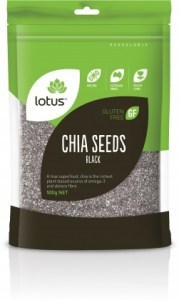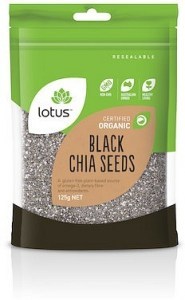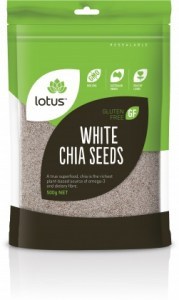
Chia Seeds

Chia Seeds are tiny, shiny, smooth seeds from the desert Chia Plant, a member of the Mint Family. They are white or black and are awarded the label of Superfood due to their high nutrient value.
The Chia Plant originally from Mexico and Guatemala was a significant and vital food source of the Aztec, Inca and Mayan people. Chia meaning ‘strength’ in Mayan, it was known as the ‘running food’ because of it’s high energy content and was used by ancient Warriers and runners. Also, used as a sacrifice in religious ceremonies, it held great significance to the Aztec people and was used as a medicine, and main food source – added to drinks, ground for meal and pressed for it’s oil.
Chia Seed is high in fibre, Omega-3 Fatty Acids and provides a good quality plant Protein. It also contains some essential Minerals and is high in antioxidants.
Being Gluten Free, this makes it an ideal superfood for the gluten intolerant.
Ways to Use Chia Seeds: Highly versatile, when soaked, it readily absorbs water or other liquids and swells into a gelatinous mass, making it ideal to add to porridge, pudding creations, or alternatively, it can be ground into a flour or meal and incorporated into baking or sprinkled sparingly, as is, on yoghurt or salads. As they easily absorb liquid and form a gel, they are also, suitable for thickening sauces or as egg replacements.
Benefits of Chia Seeds
Low in Carbohydrate: Most of the carbohydrate content of Chia is in the form of fibre, which is non-digestible. Unlike starch and sugar, fibre does not affect blood sugar levels. As such, this qualifies Chia a low carb food. It’s high fibre content means that it absorbs water and swells, giving you a feeling of satiety and slows food absorption.
Chia is made up of 14% high quality protein, and combines a good balance of amino acids to deliver the maximum health benefit. Great for vegans and vegetarians, it assists when trying to lose weight, with it’s ability to give a sense of satiety. The combination of the high soluble fibre, Glucomannan, and protein content of Chia, may assist with weight loss, by providing a sense of fullness and consequently, a reduction in appetite.
Chia Seeds are high in the Omega 3 fatty acid ALA, however, unfortunately, the body has to convert this to DHA to be readily absorbed by the body. As humans are not efficient in doing this, plant forms of Omega 3 Fatty Acids are not as efficient as animal forms, such as fatty fish like Salmon.
Chia Seed may assist with lowering blood pressure and therefore, reducing the risk of heart disease: With their high fibre, protein and Omega 3 Fat content, taking Chia regularly may assist with lowering blood pressure and reducing Heart Disease, however, recent studies have not conclusively proved this. This may be due to the fact, that a lowering of heart disease involves many factors, including improving diet and lifestyle.
Assist Bone Health: Chia is high in the nutrients that are beneficial for healthy bones. Calcium, Phosphorus, Magnesium and protein. However, Chia also contains Phytic Acid, which can impede the uptake of calcium absorption.
Chia may reduce blood sugar levels: A few studies have indicated that taking Chia, may assist with regulating blood sugar levels following a meal.
A study involving people with Diabetes showed a decrease in the blood inflammatory marker – hs-CRP when 28g of Chia was consumed daily over 3 months. This is a promising indication that Chia may reduce chronic inflammation, although more testing needs to be done in this area.
Chia is easy to incorporate into your daily diet: With it’s bland flavour, Chia Seeds can be added to just about anything to increase nutritional value of food. Having a high rate of water absorption, and to avoid a choking hazard, it is advisable to soak them first if eating directly, however, the unsoaked seeds can be added to foods such as baking, smoothies, puddings, juices, yoghurt, porridge and soups. They also make a great thickening agent for gravies and sauces. Soaked Chia can also be sprinkled onto salads, vegetables and rice dishes, and can be used as a substitute for eggs, with their ability to absorb water and fat. High in insoluble fibre, they are beneficial for assisting in reducing the risk of diabetes and providing a significant contribution to our RDI of fibre.
Also, being a good source of plant-based Omega-3 and Omega-6 Fatty Acids, they are a valuable source of healthy fat for those who are mindful of heart and inflammatory disease, Chia Seeds contain 19% protein comprising of all nine essential amino acids, which qualifies them as a good plant-based protein.
Chia Seeds are also high the following Minerals:
- Manganese: Beneficial for metabolism and growth
- Phosphorus: Tissue and bone health
- Copper: Heart Health
- Selenium: Antioxidant properties
- Magnesium: Essential for metabolism
- Calcium: Vital for bone, muscle and nerve health
When stored in clean dry conditions, they have a long shelf life, as their fats are protected by antioxidants, making them ideal as a storage staple in your pantry or refrigerator. They can even be stored in air tight containers in the freezer for longer.
Top Selling Chia Seeds
Nutrition
| Nutrients | Per 100g |
|---|---|
| Carbs: | 42.1g |
| Fibre: | 34.4g |
| Total Fat: | 30.7g |
| Saturated | 3.33g |
| Monounsaturated | 2.3g |
| Polyunsaturated | 23.6g |
| Omega-3 | 17.8g |
| Omega-6 | 5.8g |
| Trans | .14g |
FAQ:
What is the difference between Black and White Chia Seed?
The only difference between black and white chia seed is the colour of it's outer shell. They both have the same nutritional value and mild taste. Avoid brown coloured Chia seed, as this is Chia that has not ripened properly. You may choose the colour of the Chia seed to suit whether you want the seed to be visible in your baking, however, both colours have the same absorption and nutritional properties.
Are Chia Seeds Gluten Free?
Yes, they are! Incorporate Chia Flour into your Gluten Free baking and use them as a good fibre boost when on a gluten restricted diet.
Do Chia Seeds have a long shelf life?
When stored in a dry, clean environment, they can last at least 2 years in the pantry and up to 4 years in an airtight container in the fridge or freezer. Chia Meal should be stored in an airtight container in the fridge.
Do Chia Seeds have to be soaked to consume them?
No, Chia seeds can be eaten raw by sprinkling them sparingly on salads, breakfast cereals and salads or by grinding them and adding them to cakes, muffins or smoothies. However, due to their high water absorption quality, it is recommended that they are soaked for approx. 15 minutes before consuming, to avoid a risk of choking.
Is Chia grown in Australia?
Yes, Chia is sustainably grown in the Kimberley region in WA and also, the Atherton Tablelands in Qld. Australia is now one of the main global producers of Chia Seed.

Lotus Chia Seeds Black 500g
Chia, an ancient superfood, is naturally rich in Omega-3 EFA’s. It is rich in Protein, Antioxidants and Dietary Fibre. Chia is easily digestible, has a mild flavour and is an excellent source of Calcium. Add to drinks, use in baking, or as a highly nutritious hot cereal. Gluten Free.
Shop nowThe Superfood Chia Seed has been known to be a superfood for many years by the ancient Aztecs, providing them with a valuable plant based source of fibre, protein and omega-3 fatty acids. It was dubbed the running food, as it gave them energy to hunt and travel distances.
Today, with it’s many versatile uses, it can be incorporated into our Western Diets to boost nutrition, provide satiety and assist people with gluten intolerance to enjoy baked goods. Whether you add it to your breakfast smoothie, enjoy a nutritious and decadent chia pudding or add it to your energy bars and muffins, you can feel confident that you are boosting your fibre, protein and Omega-3 fatty acid intake and contributing to a healthier you!






